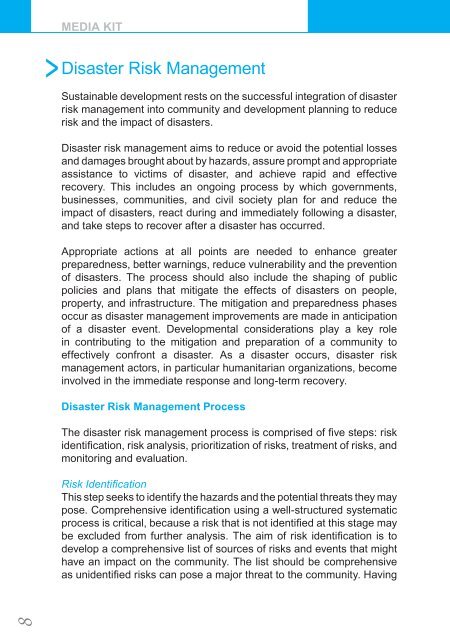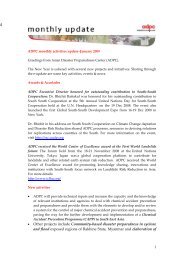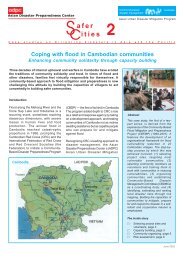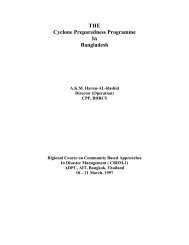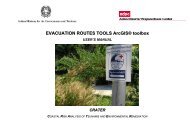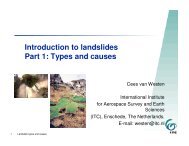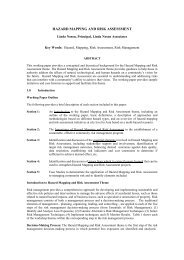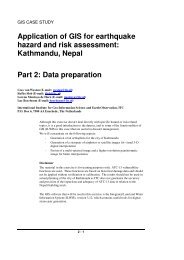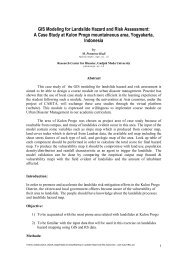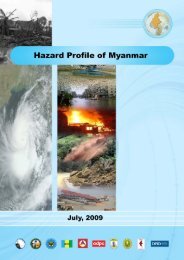community-based disaster risk management and the media media kit
community-based disaster risk management and the media media kit
community-based disaster risk management and the media media kit
You also want an ePaper? Increase the reach of your titles
YUMPU automatically turns print PDFs into web optimized ePapers that Google loves.
8<br />
MEDIA KIT<br />
Disaster Risk Management<br />
Sustainable development rests on <strong>the</strong> successful integration of <strong>disaster</strong><br />
<strong>risk</strong> <strong>management</strong> into <strong>community</strong> <strong>and</strong> development planning to reduce<br />
<strong>risk</strong> <strong>and</strong> <strong>the</strong> impact of <strong>disaster</strong>s.<br />
Disaster <strong>risk</strong> <strong>management</strong> aims to reduce or avoid <strong>the</strong> potential losses<br />
<strong>and</strong> damages brought about by hazards, assure prompt <strong>and</strong> appropriate<br />
assistance to victims of <strong>disaster</strong>, <strong>and</strong> achieve rapid <strong>and</strong> effective<br />
recovery. This includes an ongoing process by which governments,<br />
businesses, communities, <strong>and</strong> civil society plan for <strong>and</strong> reduce <strong>the</strong><br />
impact of <strong>disaster</strong>s, react during <strong>and</strong> im<strong>media</strong>tely following a <strong>disaster</strong>,<br />
<strong>and</strong> take steps to recover after a <strong>disaster</strong> has occurred.<br />
Appropriate actions at all points are needed to enhance greater<br />
preparedness, better warnings, reduce vulnerability <strong>and</strong> <strong>the</strong> prevention<br />
of <strong>disaster</strong>s. The process should also include <strong>the</strong> shaping of public<br />
policies <strong>and</strong> plans that mitigate <strong>the</strong> effects of <strong>disaster</strong>s on people,<br />
property, <strong>and</strong> infrastructure. The mitigation <strong>and</strong> preparedness phases<br />
occur as <strong>disaster</strong> <strong>management</strong> improvements are made in anticipation<br />
of a <strong>disaster</strong> event. Developmental considerations play a key role<br />
in contributing to <strong>the</strong> mitigation <strong>and</strong> preparation of a <strong>community</strong> to<br />
effectively confront a <strong>disaster</strong>. As a <strong>disaster</strong> occurs, <strong>disaster</strong> <strong>risk</strong><br />
<strong>management</strong> actors, in particular humanitarian organizations, become<br />
involved in <strong>the</strong> im<strong>media</strong>te response <strong>and</strong> long-term recovery.<br />
Disaster Risk Management Process<br />
The <strong>disaster</strong> <strong>risk</strong> <strong>management</strong> process is comprised of fi ve steps: <strong>risk</strong><br />
identifi cation, <strong>risk</strong> analysis, prioritization of <strong>risk</strong>s, treatment of <strong>risk</strong>s, <strong>and</strong><br />
monitoring <strong>and</strong> evaluation.<br />
Risk Identifi cation<br />
This step seeks to identify <strong>the</strong> hazards <strong>and</strong> <strong>the</strong> potential threats <strong>the</strong>y may<br />
pose. Comprehensive identifi cation using a well-structured systematic<br />
process is critical, because a <strong>risk</strong> that is not identifi ed at this stage may<br />
be excluded from fur<strong>the</strong>r analysis. The aim of <strong>risk</strong> identifi cation is to<br />
develop a comprehensive list of sources of <strong>risk</strong>s <strong>and</strong> events that might<br />
have an impact on <strong>the</strong> <strong>community</strong>. The list should be comprehensive<br />
as unidentifi ed <strong>risk</strong>s can pose a major threat to <strong>the</strong> <strong>community</strong>. Having


